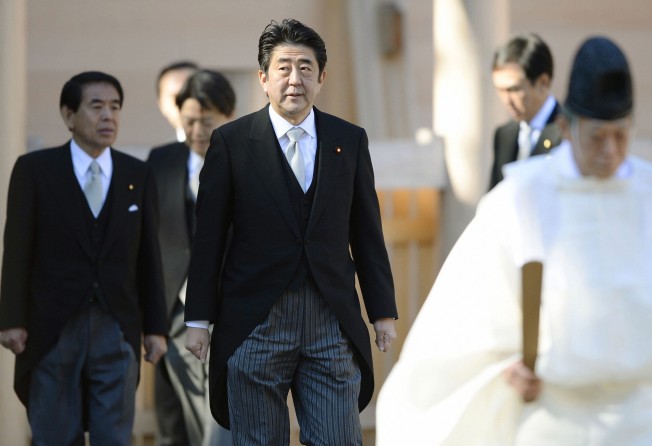Beijing turns Abe Yasakuni visit into a public relations battle on world's opinion pages
Co-ordinated editorial-writing campaign seeks to sway overseas opinion against Japan and portray China as reasonable party in diplomatic row

Beijing has orchestrated an international media campaign to condemn Japanese Prime Minister Shinzo Abe's visit last month to the controversial Yasukuni Shrine.
The Chinese government did not take strong concrete actions against Tokyo other than suspending cultural exchanges, but its overseas ambassadors have penned articles in more than 40 foreign publications since the shrine visit on December 26, a tactic seen as exerting international pressure on Tokyo.
Video: Japan PM Abe's controversial war shrine visit
The war of words broke out after China's ambassador to Britain, Liu Xiaoming, likened Japan to the villainous Lord Voldemort of Harry Potter fame in The Daily Telegraph on New Year's Day. Japan's envoy to London, Keiichi Hayashi, hit back with an article in the same newspaper titled "China risks becoming Asia's Voldemort" four days later.
Their debate continued in a BBC Newsnight episode on January 8, even though the two diplomats did not meet face to face.
China's ambassador to the United States, Cui Tiankai, is one of the latest senior diplomats to condemn Abe in writing. In an opinion piece published in the Washington Post on Friday, Cui called the Abe administration's effort to accelerate Japan's military build-up and attempt to amend its pacifist constitution "disconcerting".
"[Abe] has said that his changes to Japan's constitutional military posture would only make Japan a 'normal country'. Is he suggesting that the peaceful path Japan has followed is not normal?" Cui wrote.
Professor Lian Degui, of the Shanghai Institute for International Studies, said Beijing was seeking international empathy by framing the shrine visit as a destabilising gesture to regional peace.
"Beijing is well aware that Tokyo does not take heed of what China and South Korea think, but how the international community perceives Abe," Lian said. "By referring to the past, nations that participated in the second world war will be more inclined to side with those who suffered during the war."
China's ambassador to Canada, Zhang Junsai, wrote in The Globe & Mail on Saturday that both China and Canada "share a common responsibility" against fascism. More than 500 Canadian soldiers died helping top defend Hong Kong during the Japanese invasion during the second world war, he wrote.
Song Zhe, the Ministry of Foreign Affairs' commissioner in Hong Kong, wrote in Saturday's South China Morning Post that the shrine visit was not only a sensitive issue in Japan, but also to the international community.
Professor Niu Zhongjun, of the China Foreign Affairs University, said that by mounting an international media campaign instead of threatening to cut back ties with Tokyo, China was portraying itself as rational and level-headed.
"It shows that China is willing to discuss the issue, and let the international community understand [the issues] more," he said.